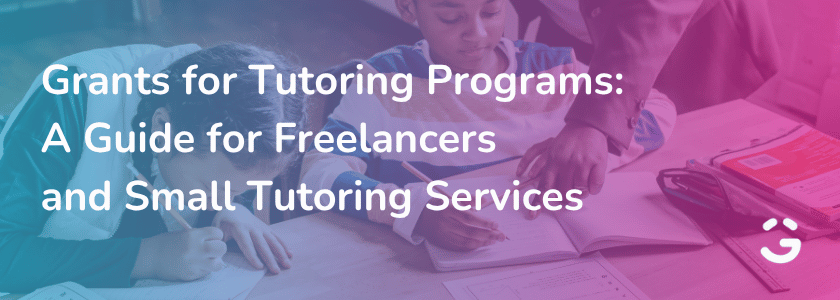Tutoring has evolved from a simple side hustle into a meaningful and scalable business. With students needing more personalized help, especially in underserved communities, the demand for quality tutoring services is higher than ever. However, not every tutor has the cash to start up the program and launch their courses.
Grants for tutoring programs can provide the extra boost you need to grow, especially when traditional funding options aren’t a fit. If you’re a freelance tutor or run a small education business, you don’t always have extra cash to launch a new course or expand your services. Grants for education businesses can help fund software, curriculum, marketing, or staff without putting your own finances at risk.
This guide will show you where to find grants, how to qualify, and how financing can help you reach more learners while building a stronger business.
Key Takeaways
- Grants are a powerful (and free) way to fund your tutoring business. Unlike loans, you don’t have to pay them back, making them a smart tool for growth without debt.
- There are multiple grant types available, including federal, state, private, and local funding. Each one supports different goals, from helping underserved students to launching innovative learning programs.
- Matching the grant to your mission increases your odds. Therefore, focus on funding opportunities that align with your goals, services, and the community you support.
- A solid business plan, mission statement, and proof of your impact go a long way in showing funders you're serious.
- When applying for a grant, be clear, follow instructions exactly, and don’t miss deadlines, as these simple steps can make or break your chances.
What Are Grants and Why Are They Worth Exploring?
Unlike loans and other funding options, grants for tutoring programs offer funding you don’t have to pay back—making them an ideal option for tutors who want to grow without taking on debt. These funds typically come from government agencies, nonprofits, or private organizations committed to improving access to education.
If you run a small education business or freelance operation, especially one that supports students in low-income areas, grants for tutoring low-income students can help you expand your reach. From covering new software to hiring help or funding outreach efforts, grants for education businesses can fill the financial gaps that often stop small tutoring programs from growing.
And if you’re gearing up to roll out a new class or digital course, tutor course launch financing—including grant support—can give you the head start you need without putting pressure on your own savings.
Types of Grants for Tutoring Businesses
Let’s break down the main sources of grants for education businesses that can help you grow and serve more students.
Federal and State Education Grants
Federal and state agencies often offer grants for tutoring programs to support small businesses that deliver real results, especially in communities that need educational support the most.
- Title I Grants – These are grants for tutoring low-income students. If your services focus on helping kids in underserved neighborhoods improve their academic performance, this is an ideal place to start.
- Promise and Innovation Grants – Perfect for tutoring businesses that want to test new, creative learning strategies. If your goal is to improve student outcomes with engaging and unique approaches, these grants for tutoring programs could provide the funding to make it happen.
- Individuals with Disabilities Education Act (IDEA) – If you work with students who use Individualized Education Programs (IEPs), you may qualify for funding through IDEA. It’s a smart way to support students while getting paid for the extra care you provide.
- Small Business Grants – Many states offer grants for education businesses through their Department of Education or Economic Development Office. These can support everything from course development to marketing and operational expenses.
Private & Nonprofit Grants
Government funding isn’t your only option. Many private foundations and nonprofits are equally committed to improving educational outcomes, especially for students who need it most.
- National Science Foundation (NSF) – If your tutoring focuses on STEM subjects (science, technology, engineering, and math), the NSF offers robust funding opportunities. These grants for education businesses are designed to support innovation and improve STEM learning outcomes.
- Chan Zuckerberg Initiative (CZI) –CZI partners with educators and researchers to back tools and programs that directly support student success. If your tutoring approach uses data-driven methods or classroom-tested tools, this could be a strong match.
- Local Community Foundations – These smaller, often overlooked opportunities can provide grants in your area. Many local organizations are looking to invest in programs that have a measurable impact within their own communities.
Local & Community Grants
Sometimes, the most impactful grants for tutoring programs are right in your own neighborhood. Local schools, foundations, and community organizations often provide targeted funding to support educational efforts where they’re needed most. These grants may be smaller, but they’re often easier to apply for and come with less competition—giving small tutoring services and solo educators a real shot at meaningful support.
Local grants can be a great fit if your program focuses on expanding access. They’re ideal for covering supplies, promoting weekend sessions, or funding outreach efforts in underserved areas.
That said, grant timelines can be slow. If you're ready to launch or grow now, Giggle Finance offers tutor course launch financing to help you move forward quickly. Our cash advances are designed for independent educators—no hard credit checks, no red tape, just fast, flexible funding when you need it most.
Ready to scale your impact? Apply for a cash advance today and give your program the boost it deserves.
How to Identify Relevant Grants for Your Tutoring Business

You’re already working hard to make a difference in your students’ lives. Finding funding should help that mission, and not add more stress. Here’s how to find the right grant without feeling stuck.
Use Grant Search Tools
Let the internet do the heavy lifting for you:
- Grants.gov – Your go-to for all things federal funding.
- Department of Education – they might have grants designed for tutoring programs like yours available.
Match the Grant to Your Goals
Before diving into applications, make sure the grant truly aligns with what you’re doing:
- Does it support tutoring, underserved students, or educational equity?
- Will it help you grow your impact, launch new services, or cover real needs?
- Are you eligible based on your business type, size, or mission?
The more aligned your business is with a grant’s mission, the better your chances.
Sign Up for Grant Alerts
Don’t want to miss out? Stay in the loop with email alerts from:
- GrantWatch
- GrantStation
- Local government newsletters and announcements online
Tips to Help You With The Grant Application Process
Grants can feel like a maze. Between the paperwork and deadlines, it’s easy to get overwhelmed. Fortunately, you don’t need to be a pro grant writer to secure funding for your tutoring business. What you need is preparation, clarity, and a strong sense of purpose.
Prepare Your Tutoring Business First
Before applying for any grants for education businesses, make sure your tutoring program is set up for success. Funders want to see that you’re organized, focused, and already making a difference.
Here’s what to get in place:
- Business Plan – It doesn’t need to be long or complicated. Just outline what your tutoring business does, who it helps, and how you plan to grow.
- Mission Statement – A few clear sentences about what drives you and what change you’re working to create in your students’ lives.
- Financials – Keep a record of your income and expenses. Even basic tracking shows that you’re responsible with money.
- Online Presence – A simple website or social media page helps funders see your work and reach. It also makes your business look more legit.
- Proof of Results – Have student success stories, parent testimonials, or before-and-after grade improvements? These can help show the real impact of your tutoring.
Bonus Tip: Your story matters. If you’ve helped students build confidence, improve grades, or feel seen and supported—make sure that’s front and center.
Write a Strong Grant Proposal
Grant reviewers don’t expect fancy language. Instead, they want passion, structure, and a clear plan. Whether you’re applying for grants for tutoring low-income students or broader education grants, this outline works:
- Executive Summary – Who are you? What do you offer? Why is it important?
- Problem Statement – What gap are you filling? (e.g., “Many students in my area can’t access affordable academic support.”)
- Goals & Objectives – Be specific. (e.g., “This grant will allow us to tutor 25 students over the next 6 months.”)
- Budget Breakdown – Show how every dollar will be used—curriculum tools, online learning platforms, advertising, etc.
- Sustainability Plan – How will your tutoring program continue after the grant ends? You could mention income from paid sessions, a sliding scale, or community sponsorships.
Bonus Tip: Instead of saying “I help students,” describe how you helped one specific student thrive and back it up with results.
Avoid These Common Mistakes
Even if your financing plan is solid, minor errors can cost you a great opportunity. Here’s what to watch out for:
- Being Too Vague – Don’t just say you help students. Describe who, how, where, and give real examples.
- Missing Information – Double-check forms and required documents. A missing attachment can derail your entire application.
- Ignoring Instructions – Don't send Word documents if the funder wants PDFs. Follow every formatting and word count rule.
- Forgetting Your Impact – Funders need to see your impact. Include numbers, quotes, or even screenshots when possible.
- Missing the Deadline – Mark due dates on your calendar and set alerts. Once a deadline passes, it’s usually game over.
Bonus Tip: You don’t need to be perfect. Funders are looking for effort, honesty, and potential, not perfection.
Don’t Let Funding Hold You Back
Growing your tutoring business takes passion, planning, and persistence, but getting the right funding shouldn’t be the most challenging part. Whether you're applying for grants or exploring tutor course launch financing, there are real options to help you scale your impact.
Grants are a great way to support your mission, especially if you're focused on helping underserved students or expanding into new communities. And while the application process takes time, the long-term payoff is often well worth it.
Need something quicker? Giggle Finance offers a faster path forward. Our cash advances are designed specifically for independent tutors and educators. There’s no long wait, no hard credit checks—and your on-time payments can even help you build credit by being reported to major bureaus.
Your work makes a difference. Let’s make sure funding doesn’t stand in your way.
Disclaimer: Giggle Finance provides Revenue-Based Financing programs for business purposes only. Any mention of any loan product(s), consumer product(s), or other forms of financing is solely for marketing and educational content purposes and to help distinguish Giggle Finance’s product from other comparable financing options available in the markets.
